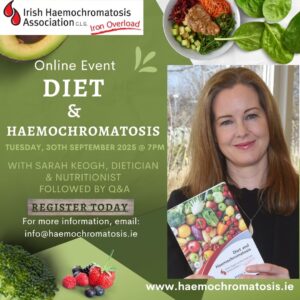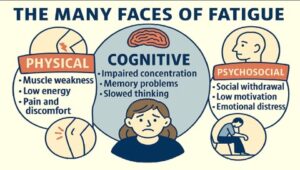
Diet & Haemochromatosis Online Event
Register today for a Diet & Haemochromatosis online event with Sarah Keogh, Consultant Nutritionist and Dietician www.eatwell.ie The event takes place on Tuesday, 30th September @ 7pm

Having a father and a brother already diagnosed with the condition, I somehow didn’t believe it could happen to me
You can watch Maria’s latest video here – https://m.youtube.com/watch?feature=youtu.be&fbclid=IwAR0cfP3hBJMrxjM-QSMaSigH9iVr4_uan2GH0uerYUZqj0DbkoPuMBbWFck_aem_AWq4zQ3xAcdUmm7wnncw-qi7NkXeJQyjHxKVW-FHvEWxTpv3yqIulRdIhwPnTNaXtcs&si=unwgrxsH_FzJX0pF&v=kZH0-4j2McY
How I was diagnosed
My diagnosis came as quite a shock when I was diagnosed with haemochromatosis (HH) in April this year. Being in the patient’s shoes rather than the health care professional’s for a change was very different. As a Dietitian, I have always been in relatively good health. Still, hereditary diseases take no prisoners despite how healthy you pride yourself in being.
Having a father and a brother already diagnosed with the condition, I somehow didn’t believe it could happen to me. Years previously, I had a low haemoglobin level. With iron being such a common deficiency for many, particularly women, I had blinkers on. I should have known better as haemoglobin is not helpful in haemochromatosis diagnosis.
It was by chance that I discovered I had the condition. I had recently moved country, and on seeking out a new GP, I went for a full medical. Thinking I was slightly anaemic, I requested a full iron profile. I had been feeling exhausted and presumed that was a result of moving my whole life across the Atlantic to Bermuda! In some ways, I was relieved that the exhaustion was as a result of this condition and it would improve once I started treatment. Several months on, having had venesection treatment I’m feeling a lot better.
Being an Advocate for your Health
Being a Dietitian and having a medical background is undoubtedly helpful in terms of managing and understanding haemochromatosis. However, you don’t need to change your diet drastically to manage the condition, although efforts to improve our eating habits are always welcome. Although highly treatable, it’s not something you can ever forget about and not take seriously. I am now more of an advocate for myself and others with haemochromatosis. I frequently remind all my family and patients to keep up to date with their regular venesections and urge all first-degree relatives to be tested. Many fall victim to being “too busy” and pushing health-related tasks further down the “to-do” list.
Looking at your Diet
The main change I have made since diagnosis was around alcohol. A glass of wine can often contain more iron than a chicken breast! Iron is also commonly added to many multivitamins designed for women, which are unsuitable if you have haemochromatosis. Thankfully, I have never been a fan of alcohol, but now I have a better reason to pass on a glass of wine with dinner!
I advise people with HH not to follow a strict iron-deficient diet. I educate patients on identifying iron-rich or iron-fortified processed foods (e.g., some breakfast cereals and bread) and recommend that these should be eaten in moderation. Many iron inhibitors, e.g. dietary fibre, are also excellent for improving our overall health, so it is another reason for me to encourage my patients to eat more of these!
Iron and Vitamin C supplements should be avoided as patients may take vitamin and mineral supplements without knowing their contents and dosages.

Register today for a Diet & Haemochromatosis online event with Sarah Keogh, Consultant Nutritionist and Dietician www.eatwell.ie The event takes place on Tuesday, 30th September @ 7pm

Dr. Michelle Murphy, a Psychotherapist and lecturer in health and social care specialist and therapist, offers practical advice for patients experiencing chronic fatigue

We were delighted to receive a generous donation of €1,160 from St. Patrick’s Cathedral community fundto support our work. Special thanks to our volunteer, Jim